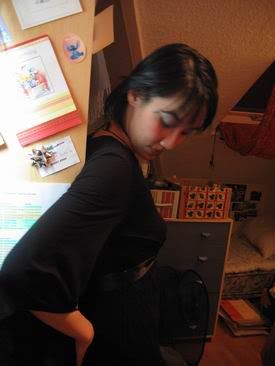I would like to thank pandabonium for his meaningful gift of the book 花と爆弹 (Flowers and Bombs), a book which consists of poems of hopes for a non-violent world. A simple gesture, to change the chain of violence into a chain of hope, to transform bombs into flowers.
The writer, Kaoru Kobashi, request readers to translate poems into the languages that we know, to spread the messages, the love, and the hopes. I tried my hand in one of the poems, to translate into a Chinese version. Hope it sounds coherent. *^_^*
Japanese - Original
青空のあなやるせなきため息か
戰の空の薄い三日月
English Translation - translated by other people
Is it a sigh of
Deep sorrow the blue sky heaved?
Above the battle field
There is a white crescent moon
Blurred in the afternoon sky.
Chinese Translation - YD's translation
听那蓝天的长叹
看那皎洁的月亮
迷蒙在那昏沉的傍晚
伴着尘土飞扬的战场
Let's spread the hope for a better world. For you, for me, for everyone.
Subscribe to:
Post Comments (Atom)

6 comments:
You are quite welcome. I am so happy to see you translate it into Chinese.
I'm amazed that the Chinese translation doesn't include the Chinese characters used in the Japanese version. I know the meanings can be quite different (for example, 手紙, "letter" in Japanese, "toilet paper" in Chinese), but I didn't think they'd be THAT different!
My word verification is "mbbyptmd", a poly-nucleic peptide that causes laboratory rats to vote Libertarian.
花 is same in both japanese and chinese.
青空, if direct traslated into chinese, would be 'green sky'. this is because in the past, there is not much differentiation between green and blue. I translated this word into 蓝天, blue sky. :D
叹息 in Chinese means sighing. the usage of 长叹 is more elaborated and flowery, it strengthen the feel of dreadness.
戰 = 战 actually. The difference is Japanese character normally use Old traditional chinese character. On the other hand, the chinese character I use is the simplified chinese characters. Traditional writing signifies the meaning of the word better, and looks better in calligraphy; while simplified character are easier to write, for lazy ppl like me. :-P
Most kanji words are in traditional chinese character, mainly because it was adopted long long time ago.
All and all good translation, yd!
Oh, where...
Oh, where has our friend YD gone...
Oh, where...
Oh, where can she be...
My dear friends! Thousand apologies!
A flu n cough that dragged for more than 2 weeks really weakened me a lot, while the heavy courseworks piling up with deadline coming up is no fun either. The 'best' is that the internet network in our house rejected my computer for no reason, resulting in having to use internet only in school... There is a good saying in Chinese, "disasters don't come alone." haha... amitabha.
I just realized how hard it is living without internet... Somehow or another, we are now 'connected' to the virtual world more than ever. :-)
Finally sorted out the network problem at home. and now testing the internet, hope the problem won't come again!
thanks friends, and sorry again for missing for too long. i miss u guys!
Post a Comment